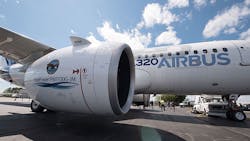Pratt Investigating Airbus Engine Vibrations as FAA Weighs Action
Pratt & Whitney is investigating incidents of excessive vibration in its engines that power Airbus SE’s A320neo aircraft, the latest in a series of problems that have plagued the new turbine, according to people familiar with the matter.
The U.S. manufacturer, a unit of Farmington, Connecticut-based United Technologies Corp., has yet to identify the cause and is assessing if there is a connection to prior design issues, the people said, asking not to be identified as the process isn’t public. Pilots have in some instances received alerts of high vibration levels during flights, and the U.S. Federal Aviation Administration is looking into the matter.
“The FAA is aware of the vibration issue, and we are currently working with Pratt and Whitney on the cause,” a spokesperson for the agency said in an emailed statement, adding that it is too early to determine whether to issue mandatory instructions to airline operators.
Pratt’s geared turbofan, a step-change in the efficiency of turbines for commercial aircraft, has been hit by a run of design flaws that have grounded planes, delayed deliveries and prompted hundreds of millions of dollars in compensation claims. About 10 Pratt-powered A320neos are typically grounded at one time as the manufacturer installs fixes.
“Pratt & Whitney is working closely with our customers to support their operations while continuing to retrofit the fleet to the latest engine configuration,” the company said in an emailed response to questions from Bloomberg News.
A spokesman for Airbus declined to comment. The planemaker, based in Toulouse, France, has said that it still expects to meet its goal to deliver around 800 aircraft this year. The company’s shares fell as much as 1.4% and were down 1.1% at 108.80 euros as of 4:49 p.m. in Paris. United Technologies traded as much as 0.8 percent lower in New York.
For Airbus to meet its annual production goal, there is “no scope for even minor further disruption arising from the new vibration issue,” Jefferies International analyst Sandy Morris wrote in a note to clients. “The risk is that the series of issues with the GTF engine may have begun to test investor’s patience.”
About the Author
Bloomberg
Licensed content from Bloomberg, copyright 2016.
